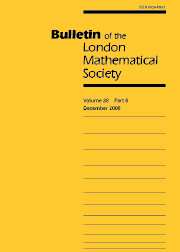GLOBAL EXISTENCE/NONEXISTENCE OF SIGN-CHANGING SOLUTIONS TO $u_t=\Delta u+|u|^p$ IN $R^{d}$
Published online by Cambridge University Press: 01 June 2005
Abstract
Consider the parabolic equation \[ \begin{array}{@{}l@{\qquad}l@{}} u_t=\Delta u+|u|^p& \text{in}\ R^d\times(0,T), u(x,0)=\phi(x)& \text{in}\ R^d, \end{array} \] up to a maximal time $T=T_\infty$, where $p>1$. Let $p^{\ast}=1+2/d$. It is a classical result that if $p\le p^{\ast}$, then there exist no non-negative, global solutions to the above equation for any choice of $\phi\geq0$; that is, necessarily $T_\infty<\infty$ and the solution blows up in some sense. On the other hand, if $p>p^{\ast}$, then there do exist non-negative, global solutions for appropriate choices of $\phi$. A recent paper by Zhang seems to be the first to consider the existence of global solutions for the above equation with sign-changing initial data. He proved that if $p\le p^{\ast}$ and $\int_{R^d}\phi(x)dx>0$, then the solution to the above equation is not global. In this paper it is shown that this result continues to hold if $\int_{R^d}\phi(x)dx=0$, and then it is shown that for each $p{>}1$ and each $l\in(-\infty,0)$, there exists a $\phi$ satisfying $\int_{R^d}\phi(x)dx=l$ and such that the corresponding solution to the above equation is global, and there exists a $\phi$ satisfying $\int_{R^d}\phi(x)dx=l$ and such that the corresponding solution is non-global.
- Type
- Papers
- Information
- Copyright
- © The London Mathematical Society 2005
Footnotes
- 1
- Cited by




